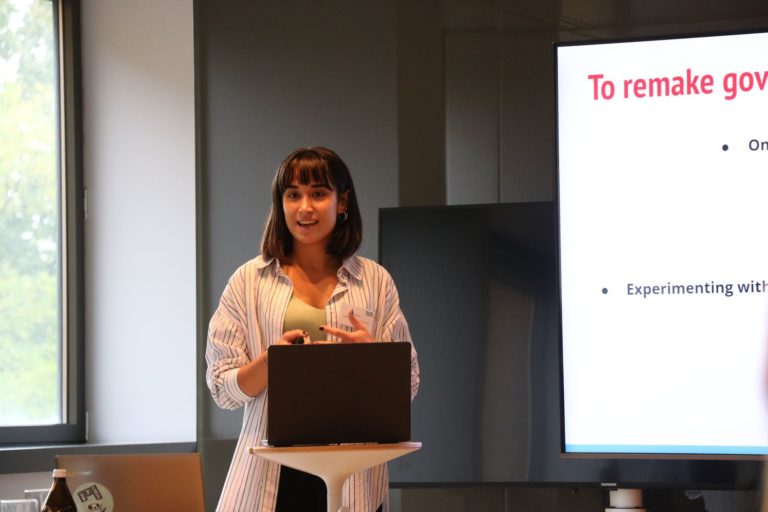TUM Think Tank
Where today's societal challenges meet tomorrow's technological excellence.

T
The second day of the forum kicked-off with another paper session by a diverse group of international researchers.
In their submission on the Quantum Workforce, Frank Leymann and Johanna Barzen, both from University of Stuttgart, presented a curriculum for educating students on the “Future of Computing.” Resulting from the projected economic value of the quantum computing market, especially in software and services, Leymann and Barzen emphasize the need for a quantum workforce fit for developing applications rather than just focusing on hardware. This dedicated and specialized workforce will require strong interdisciplinary skills to build overall quantum applications, drawing on quantum algorithms and computers, as well as classical software. Credentials from the fields of physics, software, computer science, and quantum computing will be essential in fulfilling the projected economic value and building this specifically designed quantum workforce. Leymann and Barzen affirm that “we must educate a workforce capable of building overall quantum applications.” The following discussion highlighted some further educational challenges in this rapidly evolving field. Not only does this quick evolution lead to continuously changing educational programs, but also constantly shifts industry demands, accentuating the interest in continuous education.
Moving from education to research, Astrid Bötticher (Friedrich-Schiller University of Jena), Zeki C. Seskir (Karlsruhe Institute of Technology), and Johannes Ruhland (Friedrich-Schiller University of Jena) presented a Research Program for Quantum Humanities. In their presentation, they explored the impact of quantum technology on the field of social science and humanities, as well as on society as a whole. The proposed program follows the three layers: (i) application of quantum algorithms within research touching on questions raised in humanities and social sciences; (ii) reflection of the methods, techniques, and impact that is connected to quantum computing; and (iii) societal, cultural, and social implications that are expected as a potential for upheaval. Across these three layers eight areas of focus are outlined, including chemistry, health, and transportation, all of which affect humanities and social sciences. This resulting Quantum Humanities Research Program presents a hybrid field of research, at the intersection of natural sciences and humanities, social sciences, and computing.
The second day of the forum kicked-off with another paper session by a diverse group of international researchers presenting on Quantum Design, Policy, Regulation, and Risk Management, Amnon Reichmann (Haifa University, Quantum Policy Institute), along with co-authors Mark Pecen and Axel Ferrazzini, discussed “Regulation for the Q-Time.” The authors debated what regulators might do in light of a potentially dawning – or not so soon dawning – “quantum revolution.” The proposed next steps for quantum technology (QT) regulation are to make the regulatory landscape easier to understand and to form policy packages (aka “regulate“). The authors found that the regulatory space will be defined by the surrounding regulatory process, regulatory attitudes, content, and the temporal dimension. As QT is rapidly being developed, it is important to remember that part of this process is being “built along the journey.” However, this does not mean there is a regulatory vacuum until the “quantum revolution” actually happens. Right now, the state is simultaneously anticipating and supervising the regulatory process by not only promoting standards, but also by funding R&D and capacity building. Additionally, a prominent rule-of-thumb, reiterated throughout the conference, recommended investing a share of 5% of science-based investments into ethics, policy, and regulation research. Finally, sets of existing legal norms provide a frame for new technologies like QT. For future regulation of QT, the authors stress the need for regulatory sand-boxing in a federated, multidisciplinary, and coordinated approach in order to identify and mitigate potential risks. “We have to learn from each other. If you in Germany are sand-boxing something, we in Israel should hear about it and learn from your insights.”
The second day of the forum kicked-off with another paper session by a diverse group of international researchers. The discussions around the presentations, throughout the conference, and beyond once again affirms the joint desire to start debating the societal implications of QT as it emerges. The variety of presentations proves how broad these implications can be and the many directions research might take in the future.
TL;DR
The second day of the forum kicked-off with another paper session by a diverse group of international researchers. The discussions around the presentations, throughout the conference, and beyond once again affirms the joint desire to start debating the societal implications of QT as it emerges. The variety of presentations proves how broad these implications can be and the many directions research might take in the future.








